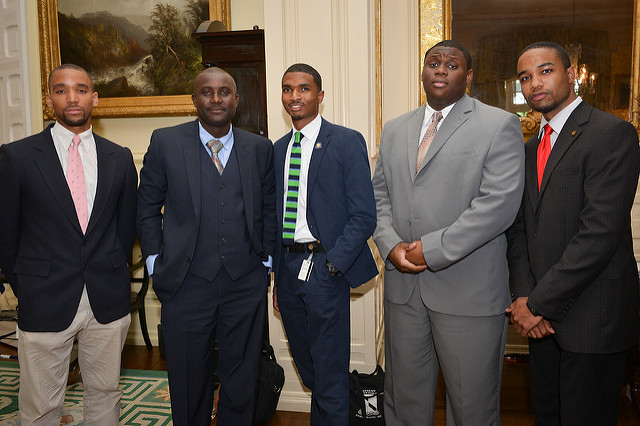The transferrable skills from a doctoral degree in the sciences
**The Edvocate is pleased to publish guest posts as way to fuel important conversations surrounding P-20 education in America. The opinions contained within guest posts are those of the authors and do not necessarily reflect the official opinion of The Edvocate or Dr. Matthew Lynch.**
A guest post by Anwar Dunbar
July 8, 2015 marked the ten year anniversary of the earning of my Ph.D. (doctor of philosophy degree) in Pharmacology from the University of Michigan. It was a tremendous accomplishment educationally and scientifically for a kid from Buffalo’s eastside. Coming from my community, it would have both far reaching effects, and social implications that I didn’t understand at the time.
On June 2, 2015, the University of Michigan’s Department of Pharmacology hosted its annual Pharmacology and Experimental Therapeutics Career Day. The event was designed to expose the department’s current students, to the multiple career options available to them following their doctoral and masters level trainings. As a key component of the day, select alumni (myself included) were invited back and asked to discuss their careers and share their experiences.
Going back to Ann Arbor is always like going home. Six of the most of the most meaningful years of my life were spent there learning about science and life. My graduate advisor for example taught me lasting lessons not only about pharmacological research, but also how to be a professional and how to survive in this world. In some ways, he was like a second father who was hard on me, and pushed me (and everyone else in the lab) to the brink to make us grow and succeed.
While I experienced tremendous growth during graduate school earning my degree, some of the most meaningful lessons about my doctoral degree itself took place after leaving Ann Arbor. College towns like Ann Arbor are unique in that the University is a major part of the town’s culture, and as such there is an unusually high concentration of highly educated individuals there. Needless to say every place isn’t like that, and you don’t realize it until you leave.
Once I left, I discovered that my degree touched people in many different ways. I actually wrote a ten part series for the Examiner titled “Pursing a Ph.D.” (http://www.examiner.com/article/pursuing-a-ph-d-part-one-what-a-ph-d-is-and-what-it-means), and in it I touched on this. In one of the installments I shared some of my biological father’s words of wisdom regarding my degree.
“I wouldn’t tell people that you’re a doctor when you first meet them. They’re going to expect you to have certain things and look a certain way.” Upon moving to Albany, NY for my Postdoctoral fellowship, my father gave me this stern recommendation. I didn’t understand why he was encouraging me to keep my great accomplishment a secret, but to make a long story short, he was afraid of other people’s expectations, and there was validity to his fears.
Our society associates the title of doctor with wealth, no matter what kind of doctor the person is. The late Dr. Thomas Stanley, author of the Millionaire Next Door series discussed in his books that being a high income professional, and the accumulation of wealth don’t directly correlate. Wealth building involves; sound money management skills, financial literacy, and in some cases delayed gratification, components that not all doctors have.
“I wasn’t aware of Dr. Dunbar’s level of education when I met him so I was unable to address him by his proper title,” said a teacher at a Career Day at a local Maryland elementary school in late May. I casually revealed to the class that I earned a Ph.D. but didn’t introduce myself as “Dr. Dunbar.” As best I could, I tried to humbly explain to her class of sixth graders that success, in this case earning a doctorate, is a door that swings both ways. That is, some people will instinctually be happy for you, celebrate your success and look at you with reverence, while others will unfortunately feel threatened and insecure about it and behave as such. This can be relatives, friends, significant others, coworkers, etc. There are numerous stories I could tell about this both good and bad, but there isn’t enough room in this piece.
In any case let’s circle back to the University of Michigan’s Pharmacology and Experimental Therapeutics Career Day. What does having a doctorate really mean? What does it actually empower one to do particularly in the sciences?
As the lone government Regulatory scientist at the Career Day, I interestingly drew the first time slot for the morning speakers. I had no idea what my peers were going to say, but surprisingly most of our talks had similar core themes. Each of us in our own way, communicated that in addition to becoming experts of our thesis projects, in my case the “Ubiquitination and Proteasomal Degradation of Neuronal Nitric Oxide Synthase,” there were a host of skills that we had all learned that were applicable to our current careers in the Public and Private sectors, and in other areas. Among them were:
- Critical thinking/Problem solving skills
- The ability to multi-task, organize and coordinate multiple projects
- The ability to write clearly
- The ability to speak and present clearly
- The ability to work on teams
- The ability to adapt and understand new systems
My classmates had all gone on to do some very impressive things. Each of us worked on research projects in the areas of; Cardiovascular Pharmacology, Receptor Pharmacology, and Drug Metabolism, just to name a few. However after graduation, not everyone had taken the traditional path of becoming tenure-track academic professors/researchers. Some had gone on to; work in the pharmaceutical industry, start their own companies, become consultants, become academic professors or administrators (at small teaching colleges), or science advocates. Our varying careers spoke in part to our department’s openness to prepare its students for the potential for other careers, in addition to the versatility of the skills that we had acquired.
In summary, earning any doctorate whether it be in the sciences or the humanities is a tremendous accomplishment. That being said, it’s what one does with the skills they’ve acquired during their thesis research that makes them great, not the degree itself. In the sciences, in addition to mastery of one’s area of expertise there a core set of skills learned. And it is these skills that make that person exceptional no matter which field they go into.
_________________________________________
Anwar Y. Dunbar is a Regulatory Scientist in the Federal Government where he registers and regulates Pesticides. He earned his Ph.D. in Pharmacology from the University of Michigan and his Bachelor’s Degree in General Biology from Johnson C. Smith University. In addition to publishing numerous research articles in competitive scientific journals, he has also published over one hundred articles for the Examiner (www.examiner.com) on numerous education and literacy related topics in the areas of; Current Events and Culture, Higher Education, Financial Literacy, and STEM (Science, Technology, Engineering and Mathematics). He actively mentors youth and works to spread awareness of STEM careers to minority students. He also tutors in the subjects of Biology, Chemistry and Physics. He is a native of Buffalo, NY. He can be contacted via email at [email protected], and can be followed on Twitter @anwaryusef.





